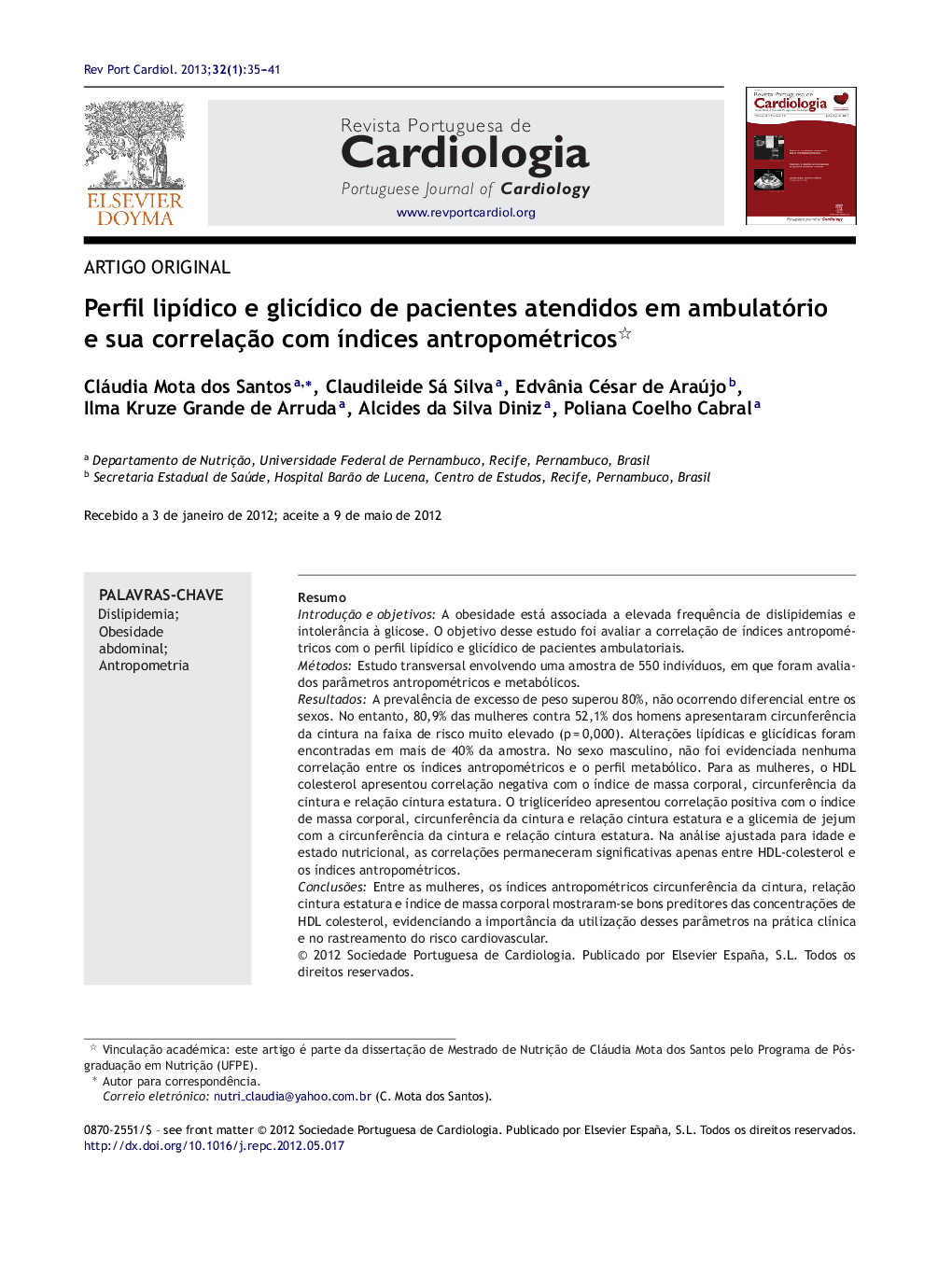| کد مقاله | کد نشریه | سال انتشار | مقاله انگلیسی | نسخه تمام متن |
|---|---|---|---|---|
| 1126202 | 954636 | 2013 | 7 صفحه PDF | دانلود رایگان |

ResumoIntrodução e objetivosA obesidade está associada a elevada frequência de dislipidemias e intolerância à glicose. O objetivo desse estudo foi avaliar a correlação de índices antropométricos com o perfil lipídico e glicídico de pacientes ambulatoriais.MétodosEstudo transversal envolvendo uma amostra de 550 indivíduos, em que foram avaliados parâmetros antropométricos e metabólicos.ResultadosA prevalência de excesso de peso superou 80%, não ocorrendo diferencial entre os sexos. No entanto, 80,9% das mulheres contra 52,1% dos homens apresentaram circunferência da cintura na faixa de risco muito elevado (p = 0,000). Alterações lipídicas e glicídicas foram encontradas em mais de 40% da amostra. No sexo masculino, não foi evidenciada nenhuma correlação entre os índices antropométricos e o perfil metabólico. Para as mulheres, o HDL colesterol apresentou correlação negativa com o índice de massa corporal, circunferência da cintura e relação cintura estatura. O triglicerídeo apresentou correlação positiva com o índice de massa corporal, circunferência da cintura e relação cintura estatura e a glicemia de jejum com a circunferência da cintura e relação cintura estatura. Na análise ajustada para idade e estado nutricional, as correlações permaneceram significativas apenas entre HDL-colesterol e os índices antropométricos.ConclusõesEntre as mulheres, os índices antropométricos circunferência da cintura, relação cintura estatura e índice de massa corporal mostraram-se bons preditores das concentrações de HDL colesterol, evidenciando a importância da utilização desses parâmetros na prática clínica e no rastreamento do risco cardiovascular.
Introduction and objectiveObesity is associated with high rates of dyslipidemia and glucose intolerance. The objective of this study was to evaluate the correlation of anthropometric indices with the lipid and glucose profiles of outpatients.MethodsWe performed a cross-sectional study assessing anthropometric and metabolic parameters in a sample of 550 individuals.ResultsThe prevalence of overweight exceeded 80%, with no difference between the sexes. However, 80.9% of women vs. 52.1% of men had waist circumference in the very high risk range (P = 000). Glucose and lipid abnormalities were found in over 40% of the sample. In men, no correlation was found between anthropometric indices and metabolic profile. In women, HDL cholesterol was negatively correlated with body mass index waist circumference and waist-to-height ratio. Triglycerides were positively correlated with body mass index, waist circumference and waist-to-height ratio and fasting plasma glucose with waist circumference and waist-to-height ratio. After adjustment for age and nutritional status, the correlations only remained significant between HDL cholesterol and anthropometric indices.ConclusionsAmong women, the anthropometric indices waist circumference, waist-to-height ratio and body mass index proved good predictors of HDL cholesterol, showing the importance of using these parameters in clinical practice and for screening of cardiovascular risk.
Journal: Revista Portuguesa de Cardiologia - Volume 32, Issue 1, January 2013, Pages 35–41